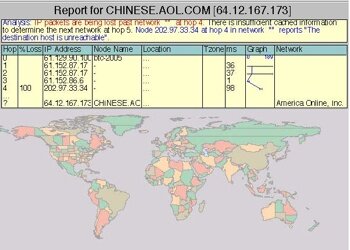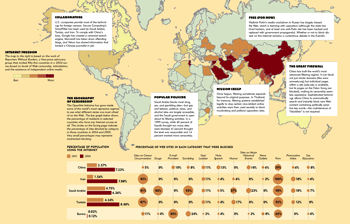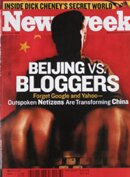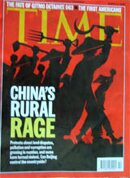Bill Gates and Chinese President Hu Jintao had a lovely dinner yesterday. And China has pledged to help combat the piracy of the firms products. AsiaPundit wonders, however, what China is doing for the company’s on-line ventures — especially the popular MSN Spaces.
The service, at the moment, is largely inaccessible in Shanghai and Beijing. Trace route tests from Shanghai indicate that access is being lost at the level of the Great Firewall. (click for larger image).

Tests on the Beijing side, however,indicate that the loss of data is occurring at the Microsoft side.:

As well as trace route and ‘ping’ testing, attempts to access through browsers in Beijing and Shanghai — including one by Microsoft’s China spokesman — failed. Access also seems to be unavailable in Haining, said the Unabrewer.
However, AsiaPundit was just told that Microsoft’s engineers could access the site at the China headquarters. If so, this would unlikely be a state-ordered block. If it was, the irony would have been rich.
Hu Jintao and Bill Gates just had a lovely dinner together on Tuesday and apparently struck an amicable friendship.:
While expressing admiration for what Gates has achieved at Microsoft, Hu also added jovially that, “Because you, Mr. Bill Gates, are a friend of China, I’m a friend of Microsoft," according to The Seattle Times.
As well as the friendship with Hu, MSN China is a joint venture between Microsoft and Shanghai Alliance Entertainment, a firm owned by a son of former Chinese President Jiang Zemin. On the face of it, one would think that Microsoft is too well connected to be the target of a Firewall-level block.
Besides, Microsoft will block websites as requested, so there really wouldn’t be a need for any state action against the MSN Spaces service.
AsiaPundit has been told that the company’s technicians are looking into the problem, although clear answers will not likely be available until people start waking up in Redmond. Accidental blocks often occur when website changes are made by content providers, as had happened with the New York Times recently. Sites are also accidently unblocked when changes are made, as happened to TypePad when it changed servers last year.
For now, AP is inclined to believe that the MSN Spaces problem is of a technical nature. That’s a shame. While a Firewall-level block would no doubt be a great disappointment to local users of MSN Spaces, it would also have been a great news story.
Technorati Tags: asia, censorship, china, east asia, microsoft, northeast asia




 HONG KONG (MarketWatch) — The family of a Chinese journalist jailed for leaking state secrets is considering legal action against U.S. Internet portal Yahoo Inc. (YHOO) for its alleged role in providing information to authorities that led to his conviction, a Hong Kong lawyer said Monday.
HONG KONG (MarketWatch) — The family of a Chinese journalist jailed for leaking state secrets is considering legal action against U.S. Internet portal Yahoo Inc. (YHOO) for its alleged role in providing information to authorities that led to his conviction, a Hong Kong lawyer said Monday.

 Yahoo! founder Jerry Yang
Yahoo! founder Jerry Yang 





 Let’s start with a quote from Liu Zhengrong, deputy chief of the Internet Affairs Bureau of the State Council Information Office, recently published in the China Daily:
Let’s start with a quote from Liu Zhengrong, deputy chief of the Internet Affairs Bureau of the State Council Information Office, recently published in the China Daily: In Chongqing, China, the police inspection team entered an Internet bar in the morning. About seven or eight students were present. One student was concentrating hard on pornographic websites and was totally unaware of the police officers behind him. The officers stood there for a miute and then they asked him to cooperate. The student stood up, his body wavered and he passed out. The police gave him some water and he came to a few minutes later. He said, "I was scared." The student was brought back to the station when he apologized and was let off with a lecture and a warning.
In Chongqing, China, the police inspection team entered an Internet bar in the morning. About seven or eight students were present. One student was concentrating hard on pornographic websites and was totally unaware of the police officers behind him. The officers stood there for a miute and then they asked him to cooperate. The student stood up, his body wavered and he passed out. The police gave him some water and he came to a few minutes later. He said, "I was scared." The student was brought back to the station when he apologized and was let off with a lecture and a warning. China’s ancient culture has outlasted famine, Mongol hordes, the British Empire, opium wars and Japanese militarism.
China’s ancient culture has outlasted famine, Mongol hordes, the British Empire, opium wars and Japanese militarism. Q1. If Chinese premier Wen Jiabao shot someone, we would never hear about it. It never happened. If someone committed the indiscretion of disclosing the fact, there would be complete denial and then the entire state apparatus would be turned on the leaker of state secrets. Nothing will show up in the Chinese press. All Internet forums and blogs will be censored, so there will be no GPS coordinate analyses. Everything that appears in the foreign media will be denounced as propaganda by hostile forces.
Q1. If Chinese premier Wen Jiabao shot someone, we would never hear about it. It never happened. If someone committed the indiscretion of disclosing the fact, there would be complete denial and then the entire state apparatus would be turned on the leaker of state secrets. Nothing will show up in the Chinese press. All Internet forums and blogs will be censored, so there will be no GPS coordinate analyses. Everything that appears in the foreign media will be denounced as propaganda by hostile forces. Microsoft has also been cowardly, but nothing like Yahoo. Microsoft responded to a Chinese request by recently shutting down the outspoken blog of Michael Anti (who now works for the New York Times Beijing bureau). Microsoft also censors sensitive words in the Chinese version of its blog-hosting software; the blogger Rebecca MacKinnon found that it rejected as "prohibited language" the title "I Love Freedom of Speech, Human Rights and Democracy."
Microsoft has also been cowardly, but nothing like Yahoo. Microsoft responded to a Chinese request by recently shutting down the outspoken blog of Michael Anti (who now works for the New York Times Beijing bureau). Microsoft also censors sensitive words in the Chinese version of its blog-hosting software; the blogger Rebecca MacKinnon found that it rejected as "prohibited language" the title "I Love Freedom of Speech, Human Rights and Democracy." Cisco sells equipment to China that is used to maintain censorship controls, but as far as I can tell similar equipment is widely available, including from Chinese companies like Huawei. Cisco also enthusiastically peddles its equipment to the Chinese police. In short, Cisco in China is a bit sleazy but nothing like Yahoo.
Cisco sells equipment to China that is used to maintain censorship controls, but as far as I can tell similar equipment is widely available, including from Chinese companies like Huawei. Cisco also enthusiastically peddles its equipment to the Chinese police. In short, Cisco in China is a bit sleazy but nothing like Yahoo. Google strikes me as innocent of wrongdoing. True, Google has offered a censored version of its Chinese search engine, which will turn out the kind of results that the Communist Party would like (and thus will not be slowed down by filters and other impediments that now make it unattractive to Chinese users). But Google also kept its unexpurgated (and thus frustratingly slow) Chinese-language search engine available, so in effect its decision gave Chinese Web users more choices rather than fewer.
Google strikes me as innocent of wrongdoing. True, Google has offered a censored version of its Chinese search engine, which will turn out the kind of results that the Communist Party would like (and thus will not be slowed down by filters and other impediments that now make it unattractive to Chinese users). But Google also kept its unexpurgated (and thus frustratingly slow) Chinese-language search engine available, so in effect its decision gave Chinese Web users more choices rather than fewer.
































